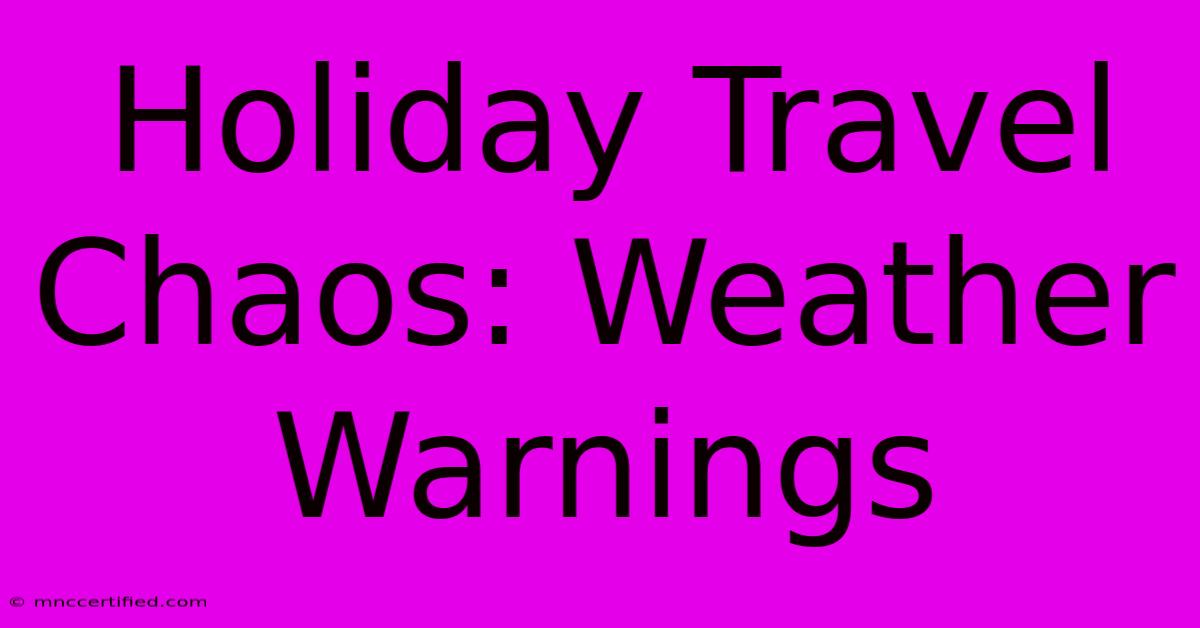Holiday Travel Chaos: Weather Warnings

Table of Contents
Holiday Travel Chaos: Weather Warnings and How to Prepare
The holiday season is a time for joy, family, and travel. However, for many, it's also a time of potential travel chaos, particularly when severe weather throws a wrench into meticulously planned itineraries. This year, be prepared. Understanding weather warnings and implementing proactive strategies can significantly reduce stress and potential disruptions.
Understanding Weather Warnings: Severity Levels
Navigating the complexities of weather forecasts can be daunting. Different countries and meteorological services use varying terminology, but generally, warnings progress in severity:
- Advisory: Expect difficult travel conditions; be aware and prepare.
- Watch: Conditions are favorable for severe weather to develop; stay informed and monitor updates.
- Warning: Severe weather is occurring or imminent; take immediate action to protect life and property.
Key Weather Events Impacting Holiday Travel:
- Winter Storms: Snow, ice, blizzards, and freezing rain can cause widespread flight cancellations, road closures, and dangerous driving conditions. Be especially aware of black ice, which is nearly invisible and incredibly dangerous.
- Ice Storms: Freezing rain creates a thick layer of ice on surfaces, making travel extremely hazardous. Power outages are also common.
- Blizzard Warnings: These indicate heavy snowfall, strong winds, and extremely low visibility, making travel virtually impossible.
- Severe Thunderstorms: Heavy rain, hail, strong winds, and even tornadoes can cause flight delays, road closures, and dangerous conditions.
- Flooding: Heavy rainfall can lead to flash floods, making roads impassable and causing significant travel delays.
Proactive Steps to Minimize Holiday Travel Disruptions
Preparation is key to mitigating the impact of severe weather on your holiday travel plans. Here’s a comprehensive checklist:
Before You Go:
- Check the forecast: Monitor weather forecasts frequently leading up to your trip, using reliable sources like the National Weather Service (if in the US) or your country's equivalent. Pay close attention to warnings and advisories.
- Pack accordingly: Include extra layers of warm clothing, waterproof outerwear, and sturdy footwear for winter travel. For all types of weather, pack essentials like medications, chargers, and snacks.
- Inform others: Share your itinerary with family and friends, including flight numbers and planned routes.
- Book flexible travel: If possible, book flights and accommodations that offer flexible cancellation or change policies. Consider travel insurance to protect your investment.
- Charge your devices: Ensure all electronic devices are fully charged before you leave, as power outages are possible.
- Download offline maps: Having offline maps on your phone can be crucial if cell service is interrupted.
During Your Trip:
- Monitor weather updates: Continue monitoring weather conditions throughout your journey. Pay attention to local news and weather alerts.
- Be prepared for delays: Factor in potential delays due to weather. Allow extra time for travel and airport procedures.
- Stay informed: Follow official channels for the latest travel advisories and updates from airlines, transportation providers, and local authorities.
- Be flexible: Be prepared to adjust your travel plans if necessary. Consider alternative routes or modes of transportation.
- Stay safe: Prioritize safety. If conditions are unsafe, postpone your trip or find safe shelter.
Utilizing Technology for Weather Awareness
Modern technology offers several valuable tools for staying informed about weather conditions:
- Weather apps: Download reputable weather apps for real-time alerts, radar maps, and detailed forecasts.
- Flight tracking apps: These apps can provide up-to-the-minute updates on flight delays and cancellations.
- Traffic apps: Use traffic apps to navigate around road closures and congestion.
Remember: Safety should always be your top priority. Don't hesitate to postpone your travel if severe weather poses a significant risk. A safe and enjoyable holiday is far more valuable than sticking to a rigid schedule. By being prepared and staying informed, you can significantly reduce the chances of holiday travel chaos caused by unexpected weather.

Thank you for visiting our website wich cover about Holiday Travel Chaos: Weather Warnings. We hope the information provided has been useful to you. Feel free to contact us if you have any questions or need further assistance. See you next time and dont miss to bookmark.
Featured Posts
-
Mercedes Vegas Advantage Wolff Explains
Nov 23, 2024
-
Bonding Basics Covalent Bonds
Nov 23, 2024
-
Rivals Of Aether Tier List 2024
Nov 23, 2024
-
Early Thanksgiving Holiday Forecast
Nov 23, 2024
-
Medical Wigs Covered By Insurance
Nov 23, 2024